Friday, November 8, 2013
Dior Dedicates an Exhibition to Miss Dior perfume
It is here important to note that Dior is sequencing the story in such a way as to present a somewhat different perfume composition (the formerly "Miss Dior Cherie" now changed into simply "Miss Dior") as the heir of the original creation from 1947 (sold now as "Miss Dior Originale" for dedicated fans). The curating of an artistic exhibition in such a way tries to mingle history and marketing in a way that highlights the heritage of the house as its prime selling vantage point. In a way this is what the revamped Dior site is trying to accomplish as well.
Beyond the story of the perfume, nevertheless, the exhibition at the Grand Palais sketches a portrait of Christian Dior the man, revealing the artistic influences of the designer who began his career as an art dealer in Paris. The loft space then includes works by Salvador Dali and Man Ray. The history of the House of Dior is also traced through original documents, manuscripts and rare photos. The objects are grouped, each time accompanied by an iconic Dior couture gown. Those with an eye for fashion history won't be disappointed.
"The Spirit of Dior, Miss Dior" is free for the public.
From November 13 to 25 at the Curve Gallery at the Grand Palais in Paris, 11am to 8pm.
Related reading on Perfume Shrine:
Miss Dior (Originale) fragrance review,
Chronology and Comparison of Fragrance Editions of Miss Dior,
Christian Dior news & reviews.
Sunday, December 26, 2010
Snapshots of Phantasmagoria

The stall market alongside the big arch at Champs, a couple of blocks before Place de la Concorde, filled with kiosks yielding under the weight of small gifts and unexpected delicacies. The lights on the trees directed upwards, forming what looks like giant chalices. Children's eyes (lots of them) filled with awe and anticipation at the sight of the big carousel and the Wheel at the square. The delectable and oh-so-sinful chocolates by Patrick Roger at Bld St.Germain in the shape of bumblebees as well as the crunchier nougatine; everything the child in all of us marvels at with unbridled glee! (If you can't get the chocolate, at least get the books). A quiet morning at Société de Géographie, its doors flanked by classical caryatids, peering over shadowy maps which delineated in their own way ~and my own interest~ the decline of the Ottomans; chased by a demi-tasse lounging and studying on the red sofas of Café Mezzanine for hours on end. The phantasmagorical shop windows on Haussman Avenue and in full contrast the sketches of a couple of clochards looking for a haven from the bitter cold under the bridges.
And what perfumes do the French wear, you might ask? The top sellers according to the info I gleaned at Sephora, Marionnaud and Galeries Lafayette (the latter comprising a lot of tourists sales as well) are Chanel No.5, J'Adore, Angel, Coco Mlle, Kenzo Flower for women and 1 Million, Eau Sauvage, Le Mâle, Boss and Terre d'Hermès for men. I suppose some of it falls under the "if it smells good and enough people buy it all the time" adage...My own nose accounted quite a bit of Lolita Lempicka, Hypnotic Poison and Guerlain's Vétiver.
Interesting all the same, all these best-selling lists, no?
Black & White photo Les Amoureux de la Bastille by Willy Ronis, painting L'Arc de Triomphe, Paris, Winter by Edouard Léon Cortès.
Thursday, June 5, 2008
Paris, Je t'Aime ~Paris by Saint Laurent: fragrance review
.jpg) In a funny little tale recounted to perfume journalist Susan Irvine, the notorious Russian perfumer Sophia Grojsman was followed by a drunk one night, forcing her to walk quicker in the night streets, upon which he called out: "Hey lady, I am not following you; I am just trying to smell your perfume!" Grojsman was working on Paris, the big, ebullient rose fragrance by Yves Saint Laurent, at the time, and this was the moment she realised "she had it". Indeed Paris has the gift -and curse, if you overdo it, as so many did in the late 80s- to be perceptible at a distance, creating a wake that will make waiters swerve on their heels, small children drop their toys to hug you and men exclaiming you smell "clean and feminine".
In a funny little tale recounted to perfume journalist Susan Irvine, the notorious Russian perfumer Sophia Grojsman was followed by a drunk one night, forcing her to walk quicker in the night streets, upon which he called out: "Hey lady, I am not following you; I am just trying to smell your perfume!" Grojsman was working on Paris, the big, ebullient rose fragrance by Yves Saint Laurent, at the time, and this was the moment she realised "she had it". Indeed Paris has the gift -and curse, if you overdo it, as so many did in the late 80s- to be perceptible at a distance, creating a wake that will make waiters swerve on their heels, small children drop their toys to hug you and men exclaiming you smell "clean and feminine".Yves Saint Laurent, an incurable romantic, created Paris in 1983 choosing rose and pink as the themes around which the fragrance would be built and dedicated it to his beloved city of inspiration and eternal love. A strange, arguably atavistic choice for someone who had caused an uproar a mere 6 years back with his contraband alluding fragrance of artificial paradises, Opium.
The fragrance is a romantic symphony, a sonorous orchestration of reportedly 232 notes blended with the artistry of someone who knows what they are doing. Like a lavish bouquet, Paris’ deepening chords of rose petal notes make the fragrance all the richer in its expression of lush warmth and womanly tenderness.
The fragrance formula actually follows quite closely the 1947 french classic L'Air du Temps (Nina Ricci) but the violet-rose fruity accord of Paris is based on ionones and damascones, aroma materials first discovered in 1893 (ionones) and isolated in 1967 (damascones); they were first used in abundance in another rose fragrance, the fiery Nahéma by Guerlain. Damascones featured heavily in the legendary Nombre Noir and contributed along with ionones to many of the formidable "roaring rose" fragrances of the 1980s. Violets naturally smell of ionones, with equal parts woody and fruity undertones, which makes them such an interesting material for the perfumer.
In Paris the rose is never just rosy: it takes all complex shades and nuances of a living room in which they decorate a flamboyant vase. Honeyed overtones of sweet, ripe fruits as well as liquor whiffs, as of dregs left in small taillé glasses after a hearty dinner, are clearly perceptible in different stages of the development. The whole embraces you in a vice-grip which asserts itself as only very affectionate feminine relatives can be: there is no escape, but you truly know they mean well.
Paris took a more daring turn visually during Tom Ford's tenure which resulted in this racy image for the European glossies. The advertisements, in tune with current designer Stefano Pilati's fashions, have -since Ford's departure from the house- reverted to tamer connotations.
Paris eau de toilette , which is more powdery and "cleaner", has a deep pink cap, while the sweeter eau de parfum has a golden cap and is fruitier. The pure parfum, intensely rosy and potent, is crowned with a prismatic cap in the shape of a reverted cone-exposing brilliant, symbolising Paris, the City of Light; designed by Pierre Dinard according to Basenotes or Alain de Morgues according to Susan Irvine.
Limited editions of versions of the original Paris for the warmer season include: Paris Eau de Printemps (2002), Paris Premieres Roses (2003), Paris Roses des Bois (2004), Paris Roses Enchantees (2005), Paris Roses des Vergers (2006), and Paris Jardins Romantiques (2007), some of which are grouped in a collectible set of minis. Typically they are lighter, girlier and less dense, highlighting a woodier, greener or muskier accord instead.
Notes:
Top: hawthorn, bergamot, juniper berries, carnation, honey, mimosa, orris
Heart: French, Moroccan and English roses, red fruits, pear liquor, violet
Base: heliotrope, musk, amber, cedar, sandalwood

Clip of Paris commercial uploaded by tylw on Youtube. Pic of ad from parfumdepub.
Monday, September 3, 2007
Sarrasins by Serge Lutens: perfume review
It is rumoured that soon Serge Lutens will relinquinsh the aromatic business and focus on his makeup line, hence the title of the review. Enjoy!
OVERTURE TO A SWANSONG
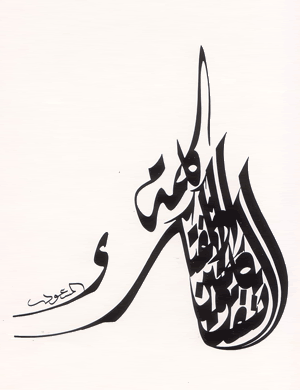 A la Nuit, launched in 2000, seemed so definitive a rendition that it was described on the Makeup Alley forum by Tania Sanchez (co-author, with Luca Turin, of a perfume guide to be published in 2008), as “death by jasmine”? It would seem as though Lutens had an afterthought about the way in which this headiest of the heady white flower notes could be treated. And why not? If it weren’t for the simultaneous release of Louve in the export line, itself a tamer reworking of the non-export 1998 Rahät Loukhoum, the issue of Lutens’s inspiration, now that his partner-in-composition Christopher Sheldrake has gone on to assist Jacques Polge at Chanel, wouldn’t be so worrisome. But, though Sheldrake is said to be pursuing his work with Lutens, there seems to be something seriously amiss in this pioneering, uncompromising, profoundly idiosyncratic house.
A la Nuit, launched in 2000, seemed so definitive a rendition that it was described on the Makeup Alley forum by Tania Sanchez (co-author, with Luca Turin, of a perfume guide to be published in 2008), as “death by jasmine”? It would seem as though Lutens had an afterthought about the way in which this headiest of the heady white flower notes could be treated. And why not? If it weren’t for the simultaneous release of Louve in the export line, itself a tamer reworking of the non-export 1998 Rahät Loukhoum, the issue of Lutens’s inspiration, now that his partner-in-composition Christopher Sheldrake has gone on to assist Jacques Polge at Chanel, wouldn’t be so worrisome. But, though Sheldrake is said to be pursuing his work with Lutens, there seems to be something seriously amiss in this pioneering, uncompromising, profoundly idiosyncratic house.Sarrasins is quite a lovely scent, actually. First word on it alluded to a more saturated version of The Different Company’s Jasmin de Nuit, a spice-laced, transparent jasmine with notes of cardamom, star anise and cinnamon. And that seemed like a logical step for Lutens: to wed the soliflore to the spices he has been exploring in his recent, export-line Chypre Rouge and Rousse, as well as in the non-export Mandarine Mandarin.
But spices are never more than alluded to – the sweaty pong of cumin, perhaps, or the cold-hot burst of cardamom, clutched to death in jasmine’s cloying embrace. Sarrasins is essentially a big jasmine embellished by animalic notes – this is how the Lutens sales assistants characterize it when asked in which way it differs from A la Nuit. An extremely tantalizing, Dzing-like, dirty-salty whiff of the feline – civet, said the SA when I mentioned it – creeps out after a few minutes on the skin. Some ten minutes later, it is joined by musk, both the softer version developed in Clair de Musc and the skankier one that made the barbaric, iconic Muscs Kublaï Khan the king of the animal fragrances. But this hint of the feral never goes beyond the whiff; jasmine’s indolic leanings towards the shithouse, which should be exasperated by the claimed adjunction of a civet-like compound, are never assuaged. The big cat is shooed out by a note that could only be described as slightly petrol-like – characteristic of jasmine-saturated compositions like Joy – and that could be the “ink” note alluded to in the press release. The deep purple tint of the juice itself, perhaps a tribute to Arabic calligraphy, emphasizes the reference. But it doesn’t seem quite enough to do to jasmine what the ground-breaking Tubéreuse Criminelle did for its namesake flower: snatch the camphor-menthol notes of the tuberose absolute and push them to the fore in a jarringly seductive assault on the nose. The very knowledgeable perfume historian Octavian Sever Coifan, in his 1000 fragrances blog, states that he distinctly recognizes the same “very nice jasmine base” in Sarrasins than in other recent launches.
Granted, not all of the Lutens-Sheldrake compositions have been shockers: Fleurs de Citronnier, Clair de Musc, Santal Blanc, Daim Blond, to name a few, all conceived for the more commercial export line, are fairly tame, unlike the Palais-Royal exclusives and their flamboyant baroque style. The principle of Lutens’s most spectacular achievements was to exacerbate a note’s characteristics – the camphor in tuberose, the cold earthiness of iris, the dustiness of patchouli, the bitterness of oak, the piss-like ammonia of honey – until they nearly toppled over into ugliness. The Lutens wear you, rather than you wear them. They exist entirely on their own terms: like the mythical palace he is said to be eternally embellishing in Marrakech, and which almost no-one has seen (or had seen the last time I was in Morocco), they exude solipcistic aloofness. Olfactory exercises in the re-creation of a vanished Oriental realm, they are cruel genies in a bottle, hard to conquer – as American aficionados have long and bitterly complained of – and not rewarding to all.
Now it seems that Lutens, retreating further into the rarefied atmosphere of this realm, is unable to send his stately decrees all the way to the Palais-Royal. They reach us muffled, like afterthoughts – Gris Clair of Encens et Lavande, Louve of Rahät Loukhoum and now, in a puzzling reversal of the export/exclusive interplay, Sarrasins of A la Nuit...
Perhaps Serge Lutens feels that he has said all he had to say in his “chemical poems” (to quote Luca Turin’s beautiful expression). Perhaps the rumours are true, and he will soon conclude his masterful opus. Let’s just hope that his swansong is more definitive than the delicious, but not irreplaceable Sarrasins.
Pic of calligraphy by Iranian artist Hassan Massoudy with the caption "Don't spend two words if one is sufficient for you." (Arab proverb). It comes from perso.orange.fr
Wednesday, August 29, 2007
Suck it, you bitch!
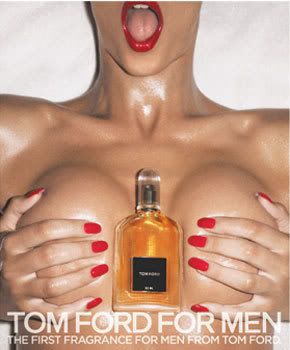
So the news is mr.Ford is issuing a masculine sidekick to his Black Orchid for women scent this season called Tom Ford for Men and the advertising comprises the image above.
I know, I know...It is no secret that mr.Ford has been playing the "sex sells" card again. This is the only adage he has been exploiting for quite some time now. In fact as long as I can remember his pretty mug entering my consciousness. Mr.Ford had been exploiting a subtler aproach while at Yves Saint Laurent, although one would be hard pressed not to admit that it somehow clashed with the extraordinarily chic facade of the venerable house, a fact that brought him into direct confrontation with mr. Saint Laurent himself (the latter with genuine Gallic nonchalance selling his House and retiring, thus admiting there is little chic in today's designing world).

And yet one cannot find major fault with the images of the advertisements for Yves Saint Laurent perfumes while mr.Ford was in charge. From the infamous print ad for the masculine M7 which depicts an uncircumsized hairy male in all his nude glory (click here for a pic) to the daring suggestion of a menage a trois in the Paris ads ~which for a nano-second made me look upon this fragrance with quite a different eye (shame on me!)~, his stint at Saint Laurent was characterised by an aesthetic that was bold, daring but rather tasteful albeit in a Hollywood-sort-of-way.
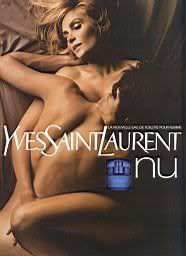
The porcelain nude skin of Sophie Dahl for Opium stands among the most memorable ones and this one for Nu eau de toilette featuring director Roman Polanski's wife, french actress Emmanuelle Seigner, from 2003 is among the ones I personally find quite alluring. Of course Emmanuelle Seigner does have the heavy features that denote some sort of vulgar carnality that helps make her compelling despite her lack of serious talent in such films as Bitter Moon and The Ninth Gate. Still, the entanglement of bodies in amorous embrace in the print ad captures my fancy and makes me dream a little.
Which is not what the new ad for Tom Ford for Men does. And not for prudish reasons either.
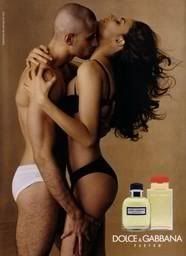
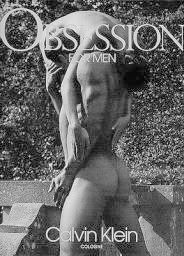
It seems to me that mr.Ford has taken the place of sexual provocateur that Calvin Klein used to be in the 1980s, although with a much more agressive stance and ~dare I say it?~ less modesty and self-constraint. The above might seem ironic for someone who built a reputation for racy ads such as this one for his scent Obsession in 1988.
Simply put, the current ad for Tom Ford for Men lacks taste. But what is even more interesting is that it also lacks sexiness. That elusive quality that an image which possesses it makes you look, look away and then look again with renewed interest, much like a really intriguing woman on the street would have you double-checking instead of ogling at her openly displayed attributes. The supposedly orgasmic O of the red lips as a signal of availability, the distorted shape of the breasts with the talons painted in red holding them tight for a titty-fuck, the dominance of male over female in a position that reminds one of a porn flick: all these things debase the previous aesthetic of Ford efforts into the realm of the basest shock value attempts at capturing the interest of people by getting banned from major magazines. And this is coming from someone who wouldn't venture into what he is showing everyone else, due to his own sexual preferences. So, is this choice a deliberate attempt at a new form of exclusivity? In accordance to his Private Line of perfumes which supposesdly target a more daring audience? This is something for mr.Ford to answer and we can only speculate. I am trembling at the thought of what he might conceive next!
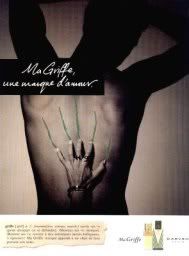
For the purpose of aimless exercise and because there is such a thing as collective memory, let's witness some sexy advertsing images that do not usually get mentioned. The following two are for the classic scent Ma Griffe(=my talon/my signature),
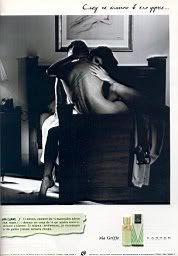
proving that older advertsing isn't necessarily less sexy or daring and the other one is from Lacoste pour homme which depicts a fetching specimen with a Y chromosome aimed at the discerning women that account for more than 70% of the sales of men's scents anyway.
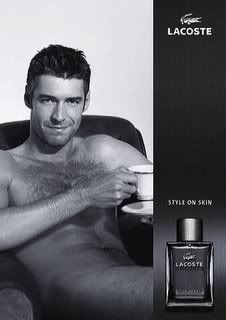
But I guess mr.Ford missed that little factoid. On the other hand, as he is indeed a brilliant marketeer (as attested by his success so far) he might be privy to some information of greater magnitude, so I am keeping my mouth shut on more comments for now. Which is more than I can say for the woman in the ad!
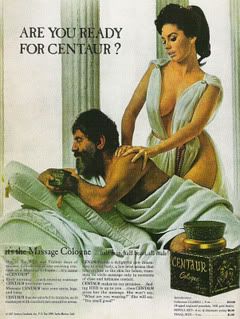
Last but not least, he could have gone for the highly camp effect which would have earned him humorous brownie points, such as this one for Centaur Cologne. There, that's so much better!

Pics courtesy of wwd, okadi, imagesdesparfums and psine.net
Thursday, November 9, 2006
Perfume advertising 3: gender play (multimedia clips)
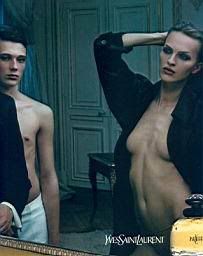
The issue of what differentiates female from male idiosyncrasies in general is complicated enough. In perfume terms the composition of different formulas for the two sexes (roughly floral and oriental for the ladies, woody and citrus for the gentlemen) is a fairly recent phenomenon, dating from the dawn of modern perfumery in the end of the 19th century. Up till then, there was pretty much lots of leeway for men to delve in floral waters of the Victorian era or even the rich civet and musk laden compositions of the 18th century decadence. The issue of how male and female attributes translate in the iconography of perfume though is worth investigating for its many surprising facets.
Here today I decided to delve in some perfume commercials that redefine the role of gender as we know it.
The 70s were the years when it was acceptable for the first time after many long years for a woman to appear in pants. Up till then, emulating a man’s wardrobe was considered outré and not to be encouraged. In upscale restaurants and hotels in the 60s, time of the mini, it was customary to ask ladies in pantsuits to remove the pants and just wear the long jackets as dresses. Katherine Hepburn in her signature slacks was repeatedly asked to use the staff hotel stairways when going to see Spencer Tracy some years prior. In that regard, the first ad for perfume that showcased this new freedom was Charlie by Revlon. Codenamed “Cosmo” while being developed, as this was intended for the young and liberated Cosmopolitan readers, that magazine being full of women’s liberation articles back then besides the tips for better sex; it then got named Charlie from the first name of Charles Revson, owner of Revlon. The face of Charlie was Shelley Hack whom you may remember as part of “Charlie’s Angels” TV series, here with Bobby Short. Watch the clip clicking here
Indeed watching the commercial, Shelley dressed in a shiny satiny ensemble of pants and shirt, with a matching little hat on her short bouncy do, it takes a close up to see that it’s actually a female. The fact that she is thin and with no discernible décolletage makes it even more risqué. As she sprays the perfume on her neck while in the car before getting out at her destination we get a glimpse of what an emancipated woman is like; driving, wearing the pants, getting alone to the place she is invited. There is no need for a man to accompany her. She is the man in her life. So recent commercials compared to that seem to tie women to their traditional roles of either homemaking material (pretty, happy) or dangerous fantasy (aggressive seductresses). But that is as much a societal phenomenon as to warrant a separate article of its own on another venue.
Many years later it was advertising provocateur Calvin Klein who brought homosexuality in the mainstream with his memorable commercials. As an aside when talking about the issue, please note that it is males of such a preference who feature prominently in the ads, not women. This may have to do with more homosexual men being involved in the media in the first place (and we all know the designing world is full of them), but it also has to do with the taboo of female homosexuality in advertising as well. For some reason, women in advertisers’ minds should be seen as dynamic, but not butch, aggressive as they are often depicted in the sexual arena, but not manly. I guess it has to do with the male mindframe being deeply disturbed by the idea that a woman renounces the attributes that make him the center of her universe, even though he may renounce those that make him desirable to her! Egotistical though it may sound, men seem flattered if women are concentrating on them. Homoerotic female images are desirable – and intensely so- only if they entail a man eventually and only if the ladies in question outwardly look very stereotypically feminine. To revert to Calvin Klein though, his commercials exploit the homoerotic ideal to the max. A series of commercials for Obsession as well as Eternity used photographer Herb Ritts as the vehicle for an aesthetic that was distinct in an American way.
To witness, these 4 short clips for Eternity for men from the 80s, featuring the exotic Shana Zadhrick as the female presence in an otherwise male territory, which idolize the male physique, sculpted during long hours at the -then- temple: the gym. The droplets of water on rippled flesh, the eroticism of swimmers’ bathing suits, the movement that is resembling diving. Everything speaks of the promise of a different erotic experience.
Watch the clip clicking here
And then of course we have the cheeky ironic representation of Le Male by Jean Paul Gaultier. The theme is reprised in a tongue-in-cheek way (as Gaultier takes himself far less seriously than Klein) and the sailor and his uniform, both a nod to a popular homosexual icon and Jean Paul’s favourite matelot top as well, make their appearance in ads that emanate a playful mockery. Le Male the jus is full of the traditional male note of lavender and yet it is so sweet that it has a candy like tone, like only someone who is totally oblivious to rules of propriety is capable of carrying off. In the following commercial Gaultier not only depicts the sexual deviant of a sailor, but dresses a woman in the sailor uniform -shot from behind, walking in what seems a bar full of such sailors- in a transvestite effort in reverse, having her kiss another male, only to reveal that underneath her clothes she is corseted in the traditional attire of her sex from long ago, to match the torso of his eponymous feminine scent, known as Classique. It is important to note that the ad refers to men and the eternal female. Even openly homosexual men have their prejudices about women I guess, or perhaps they have had strong female icons in their environment shaping their views on the subject, as in Gaultier’s case with his grandma. Watch the clip clicking here
In another Jean Paul Gaultier commercial, this time for Classique only, several models sit on a table talking about l’amour (love), differentiating in attire and image as day and night, one of them being the androgynous Eve Salvail, a Canadian model with a tattoo on her shaven head. The old woman suddenly and briefly morphs into Gaultier himself, as if the designer wants to remind us that some part of his grandmother's spirit which inspired the perfume still lives in him. Whatever, Classique is a very feminine scent. Watch the clip clicking here

While at it, you can witness the difference in perception of what is appropriate and what is not in the iconography of these two similar print ads for Paris by YSL, under artistic direction of Tom Ford. The top one is the US version, nipples covered and the effeminate face of the guy cut from the photo, only the cuff hinting at a ménage a trois. In the European version, shown here, however, such niceties do not cut it and the whole deal is laid bare –pun intended- for readers. Pity Paris perfume which used to be viewed as elegant, it now has earned a reputation for racy.
Last but not least, Calvin Klein again plays the gender bender with his masterful commercial "Altered States" (which reminds me of a William Hurt starring film) for both CKone and CKbe. The diaphanous and black bottles respectively are used in brilliant effect for a morphing computer play that emits a weird and truly wonderful vibe that compels the viewer to watch the clip over and over again. I find it seriously cool in its androgyny despite the eerie factor. The limits between the sexes have never been thinner and the interplay between the two is evinced in the unisex jus of the two perfumes which represent two different moods, but never two different sexes. Watch the clip clicking here The 90s heralded the cult of the unisex, or euphemistically called shared perfumes and the commercials that played upon this were many and varied. In my opinion this is the most memorable and worth watching one. What the future brings is anyone's guess.
Next post will revert to softer, more romantic notions and the discrepancy between image and smell.
Pics from imagesdesparfums.
This Month's Popular Posts on Perfume Shrine
-
Andy Tauer of Tauer Parfums is having his Advent Calendar again this year for the length of December, countring down till Christmas. For the...
-
First things first and if you think you have a lucky bone in your body, do drop a comment regarding the Advent Calendar that Tauer Perfumes ...
-
Tauer Perfumes need no introduction: Probably the most successful internet-stemming indie fragrance phenomenon which built sufficient word o...
-
How many times have you heard that line in one variation or another? Or are you one of the sufferers who feels like you're going to erup...
-
The newest Andy Tauer fragrance, Orange Star , is based on his previous soap-making for Christmas-giving for which he produced Mandarins Amb...
-
It was a few days ago that I came forward and announced that Andy Tauer is relaunching one of his less well known perfumes in his line: Eau...
.jpg)






